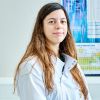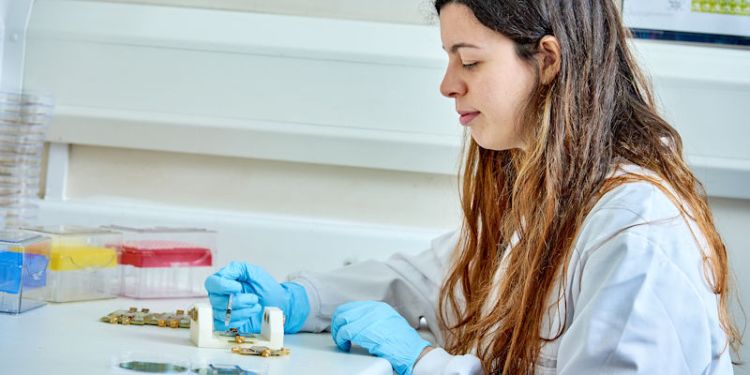
Africa Smith De Diego
- Course: Tissue engineering and regenerative medicine CDT
- PhD title: Rapid, label-free separation of mesenchymal stromal cells for musculoskeletal disease therapies
Using electronics-on-chip technology to seperate stem cells for regenerative medicine
Africa Smith De Diego is a postgraduate researcher based in the bioelectronics lab area in the School of Electronic Engineering. She is investigating tissue engineering and regenerative medicine as part of an EPSRC-funded Centre for Doctoral Training (CTD) project.
Africa’s research involves designing and fabricating microfluidics chips using Engineering’s cleanroom facilities, and cell culturing facilities in Dentistry. She aims to tackle the optimisation of stem cell extraction from clinical samples through her research. This includes examining stem cells which she inserts into a silicon chip, and uses electronics to test optimal cell separation conditions. She said:
“I first characterise the cells’ dielectric properties at different conductivities at St James’ hospital. The data I collect is then fed back into a Finite Element model of the device. This model is used to select the optimal separation conditions and design the chips accordingly. I then use the cleanroom facilities to fabricate the piezoelectric chips and the moulds for the microfluidic channels.
“Once the device has been wired, I test the separation of different cell types for different frequencies and conductivities at St James hospital. The separated stem cells retrieved are then tested in vitro, and later in vivo, to check that the cells are still viable and able to produce bone.”
I first characterise the cells’ dielectric properties at different conductivities at St James’ hospital... I then use the cleanroom facilities to fabricate the piezoelectric chips and the moulds for the microfluidic channels.

Designing a cell-separation device for bone marrow samples
Africa is tacking the optimisation of stem cell extraction through her research. The aim of her project is to advance tissue regeneration and minimise risk. She said:
“My project aims to tackle the optimisation of stem cell extraction from clinical samples. Autologous mesenchymal stem cell (MSC) based therapies offer potential solutions to clinical challenges such as the repair of critical bone defects following trauma.”
“However, MSCs are present in really low proportion so a concentration step is necessary. Usually, this involves the use of antibody labels or cellular expansion outside the operating theatre, which is expensive, time consuming and can have deleterious effect on the patient.
“To isolate a patient's own stem cells in real intra-operative time and without the need to add extrinsic labels or expand cells in culture would greatly expedite tissue replacement and repair while minimising patient risk. Ultimately, this is my goal.”
She continued:
“The aim of my research is to use this SAW-DEP technology to develop a working prototype device capable of separating specific stem cells from clinical bone marrow samples at high throughput with minimal manipulation and retained cell functionality.
“For this, we use remote dielectrophoresis (DEP), where an electric field is coupled into a microfluidic channel using surface acoustic waves (SAW) generated in a piezoelectric material.”
The aim of my research is to... develop a working prototype device capable of separating specific stem cells from clinical bone marrow samples at high throughput with minimal manipulation and retained cell functionality.
EPSRC funded projects
Africa’s current project in tissue engineering and regenerative medicine is funded by the EPSRC, and it involves working across multiple disciplines. She said:
“My research involves knowledge in modelling, cleanroom fabrication, microfluidics, cell culturing and histology. Both departments provided me with training on the different pieces of equipment as well as courses to further my understanding of the techniques.”
Collaborative research
Africa explained why she enjoys being part of the community of postgraduate researchers at Leeds. She said:
“I am part of the bioelectronics group and the faculty of Dentistry at St James hospital, which ensures I have supervisors and equipment to carry out my interdisciplinary research.
“The presence of other PhD students in the offices create a sort of “research hub” where we all share our experiences and can give each other recommendations on experiments in a relaxed atmosphere. This is very helpful as it introduced me to new techniques that can I later adapted for my project that I would not have considered otherwise.”
She added:
The help of postdocs was also invaluable, as they were always there to help new PhD students with the different laboratory techniques or software needed.
The presence of other PhD students in the offices create a sort of 'research hub' where we all share our experiences and can give each other recommendations on experiments in a relaxed atmosphere.
Interdisciplinary learning
Africa talked about her decision to pursue her research at the University of Leeds and her journey so far. She said:
“I came to the University of Leeds attracted by the possibility of working in a multidisciplinary setting and applying my knowledge in the exciting field that is tissue engineering. A biotechnologist by training, I have always been interested in both engineering and biology and interdisciplinary nature of this project has opened opportunities for me.
“Two of my supervisors are based in engineering and are leaders in the field of molecular nanotechnology, biosensors and surface acoustic waves.
I came to the University of Leeds attracted by the possibility of working in a multidisciplinary setting and applying my knowledge in the exciting field that is tissue engineering.
Africa continued:
“I also have two supervisors in the Faculty of Dentistry that are specialists in bone regeneration, biomimetic scaffolds and stem cell therapies, which have supported my learning in cell culturing, histology and surgery.”
“Having four supervisors, it may seem like it would be hard to organise meetings and schedule research. However, I have been lucky enough to find supervisors that trust me and allow me to think independently whilst still supporting me whenever I needed it throughout this PhD journey.”
She added:
“They have given me the opportunity to be actively involved in collaborations with companies and other departments, which has allowed me to become more adaptable and to have a better idea of what I would like to do in my future career.
...I have been lucky enough to find supervisors that trust me and allow me to think independently whilst still supporting me whenever I needed it throughout this PhD journey.
Centres for Doctoral Training
Our CDT researchers automatically become members of the University’s Doctoral College.
Browse the current opportunities we are offering if you would like to know more.

